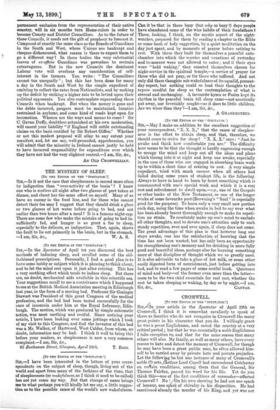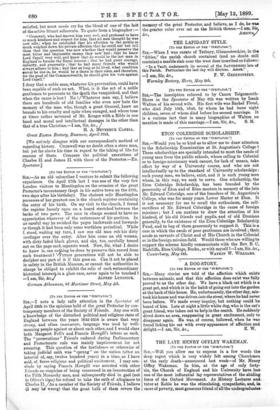CROMWELL.
[To THE EDITOR OP IRE "SPECTATOR."] StnAn your article in the Spectator of April 29th on Cromwell, I think it is somewhat cavalierly to speak of those as fanatics who do not recognise in Cromwell the many great points in his character that you do. I willingly grant he was a great Englishman, and saved the country at a very critical period ; but that he was essentially a noble Englishman I take exception to, and that for the same reason that many others will also. My family, as well as many others, have every reason to hate and detest the memory of Cromwell, for though he may have been a great public man, he often allowed him- self to be carried away by private hate and private prejudice. Let the followim be but one instance of many of Cromwell's noble (?) acts.A.rthur Lord Capell had surrendered Colchester on certain conditions, among them that the General, Sir Thomas Fairfax, passed his word for his life. Yet do you think this—one of the first conditions of surrender—affected Cromwell ? No ! On his own showing he had not one spark of honour, one s rk of chivalry in his disposition. He had sanctioned already the murder of his King, and yet was not satisfied, but must needs cry for the blood of one of- the kit of the active Stuart adherents. To quote from a biographer :— " Cromwell, who had known him very well, and professed to have so much kindness and respect for him, that all men thought he was now safe ; when he coneluded that his affection to the. public so much weighed down his private affection that he could not but tell them that the question was now whether they would preserve the most bitter and implacable enemy they now had ; that he knew Lord Capell very well, and knew that he would be the last man in England to forsake the Royal interest ; that he had great courage, induidtry, and generosity ; that he had many friends who wotild always adhere to him ; and that as long as he lived, what condition N oever he was in, he would be a thorn in their sides, and therefore, for the good of the Commonwealth, he should give his vote against Lord Capell."
I deny that a noble man, whatever his provocation, could hare been capable of such an act. What, is it the act of a noble gentleman to persecute to the lath the vanquished, and that when the cause is lost ? No 1/Whatever men say, I believe there are hundreds of old families who even now hate the memory of the man who, though a great General, knew no bounds to his cruelty and spite when enraged, and whose tone at times rather savoured of Mr. Kruger with a Bible in one hand and moral and intellectual damages in the other than that of a true Christian.—I am, Sir, &c., H. A. lktvr.aEux CAPELL.
Great Easton Rectory, Dunrnow, April 29th.
[We entirely disagree with our correspondent's method of regarding history. Cromwell was no doubt often a stern man, but yet far above his time in regard to the taking of life for reasons of State. Compare the political executions of Charles II. and James II. with those of the Protector.—En. Spectator.]







































 Previous page
Previous page